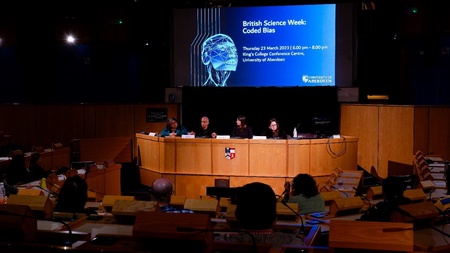As part of British Science Week, we held a hybrid screening of the film “Coded Bias” at the King’s Conference Centre. Coded Bias explores algorithmic biases in facial recognition and pushes for legislation to govern against bias in AI. The film asks topical and often provocative questions, including questioning the impact of the application of AI on our society and identifying the social consequences when AI is biased toward race, colour, or gender.
Following the film, we held an interdisciplinary Q&A panel discussion, where Dr Patricia Živković (School of Law), Dr Yaji Sripada (School of Natural and Computing Sciences), and Dr Clare Sutherland (School of Psychology) further debated the benefits and risks of face recognition AI. Among the many topics covered were recent advances in AI technology, ethical issues, the similarity of AI and human biases, and how to best regulate these new technologies in law in Scotland. The debate was very engaged, helped by the fantastic curiosity and thoughtful participation of the audience. Finally, we concluded with a networking event, which allowed for an intellectually stimulating change of ideas. During this networking session, guests also had the opportunity to participate in some interactive demos to find out more about research on AI going on in the School of Psychology.
The event was chaired by Prof. Eleonora Belfiore, Director of the University’s Interdisciplinary Centre of Social Inclusion and Cultural Diversity, part of the University’s 2040 strategic commitment to equality and diversity. Indeed, the film raises awareness of the effect that AI can have on society's existing race-, class- and gender-based inequities. This theme is extremely relevant, especially here at Aberdeen University, a very international institution with members from over 130 different countries, where inclusion, equality, and the celebration of diversity, are leading values of our community.
We would like to thank the University of Aberdeen Development Trust and the School of Psychology for the funding which supported the realization of this event. We also appreciate the help of the Public Engagement with Research team of the University of Aberdeen in the organization. Many other people greatly contributed, including Kevin Allan and other members of staff in the Psychology Department, along with students Leoni Masroujah, Mairi Irvine, Barbora Illithova, Stephanie Wilcke, Danai Papadaki, and Jacobo Azcona. Finally, we would also like to extend a very warm thank-you to all the guests that attended the event. You contributed to a thought-provoking discussion by creating a stimulating, open and friendly atmosphere. Thank you all for joining us for this event!


